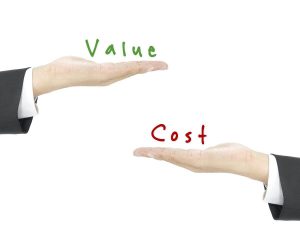[caption id="attachment_2747" align="alignright" width="300"]

New Jersey courts allow double dipping: the nontitled spouse receives their share of business value, which is based on future income, and on top of that, receives a portion of that very same income as it is earned.[/caption]
In a divorce case in which one spouse owns a business, the business is generally subject to equitable distribution; that is, each spouse receives their equitable share of the value of the business. Practically speaking, this does not mean that the business is sold and the proceeds divided but rather, that the nontitled spouse receives money or other property equal to their equitable share of the business value.
The problem arises in the conflict between the income stream used to value the business and the income stream used to calculate spousal support.





 Reducing costs can help you increase cash flow and, as a result, the value of your business.[/caption]
The value of a business is based on two factors: the expected future cash flow of the business and the risk that future cash flow will occur when and in the amounts expected.
Cash flow and risk are the meat and potatoes of business valuation. The valuation report that is produced is just a detailed analysis of these factors.
Reducing costs can help you increase cash flow and, as a result, the value of your business.[/caption]
The value of a business is based on two factors: the expected future cash flow of the business and the risk that future cash flow will occur when and in the amounts expected.
Cash flow and risk are the meat and potatoes of business valuation. The valuation report that is produced is just a detailed analysis of these factors.  New Jersey courts allow double dipping: the nontitled spouse receives their share of business value, which is based on future income, and on top of that, receives a portion of that very same income as it is earned.[/caption]
In a divorce case in which one spouse owns a business, the business is generally subject to equitable distribution; that is, each spouse receives their equitable share of the value of the business. Practically speaking, this does not mean that the business is sold and the proceeds divided but rather, that the nontitled spouse receives money or other property equal to their equitable share of the business value. The problem arises in the conflict between the income stream used to value the business and the income stream used to calculate spousal support.
New Jersey courts allow double dipping: the nontitled spouse receives their share of business value, which is based on future income, and on top of that, receives a portion of that very same income as it is earned.[/caption]
In a divorce case in which one spouse owns a business, the business is generally subject to equitable distribution; that is, each spouse receives their equitable share of the value of the business. Practically speaking, this does not mean that the business is sold and the proceeds divided but rather, that the nontitled spouse receives money or other property equal to their equitable share of the business value. The problem arises in the conflict between the income stream used to value the business and the income stream used to calculate spousal support.
 Outsourcing your bookkeeping and back office tasks can free you up to focus on your business[/caption]
Small-business owners bring expertise and commitment to their companies, but many find they are often too busy running their operations and taking care of their customers to deal with paperwork. We all know how quickly those stacks can pile up, and unfortunately, it’s all too easy to lose track of bills that must be paid. And what about reconciling the corporate checkbook on a timely basis?
Outsourcing your bookkeeping and back office tasks can free you up to focus on your business[/caption]
Small-business owners bring expertise and commitment to their companies, but many find they are often too busy running their operations and taking care of their customers to deal with paperwork. We all know how quickly those stacks can pile up, and unfortunately, it’s all too easy to lose track of bills that must be paid. And what about reconciling the corporate checkbook on a timely basis?